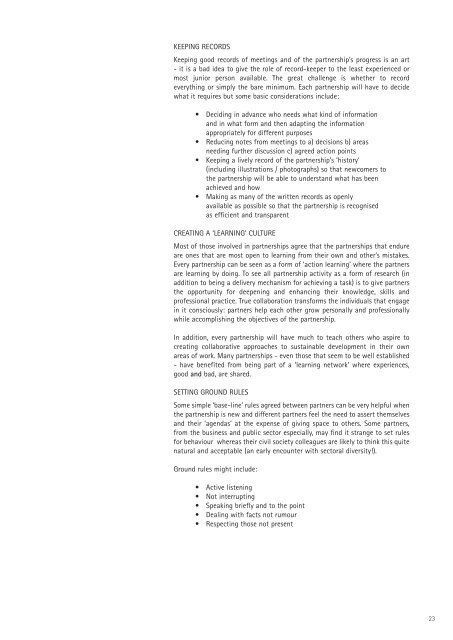Partnering
The Partnering Toolbook - Energize, Inc.
The Partnering Toolbook - Energize, Inc.
- No tags were found...
You also want an ePaper? Increase the reach of your titles
YUMPU automatically turns print PDFs into web optimized ePapers that Google loves.
KEEPING RECORDS<br />
Keeping good records of meetings and of the partnership’s progress is an art<br />
- it is a bad idea to give the role of record-keeper to the least experienced or<br />
most junior person available. The great challenge is whether to record<br />
everything or simply the bare minimum. Each partnership will have to decide<br />
what it requires but some basic considerations include:<br />
• Deciding in advance who needs what kind of information<br />
and in what form and then adapting the information<br />
appropriately for different purposes<br />
• Reducing notes from meetings to a) decisions b) areas<br />
needing further discussion c) agreed action points<br />
• Keeping a lively record of the partnership’s ‘history’<br />
(including illustrations / photographs) so that newcomers to<br />
the partnership will be able to understand what has been<br />
achieved and how<br />
• Making as many of the written records as openly<br />
available as possible so that the partnership is recognised<br />
as efficient and transparent<br />
CREATING A ‘LEARNING’ CULTURE<br />
Most of those involved in partnerships agree that the partnerships that endure<br />
are ones that are most open to learning from their own and other’s mistakes.<br />
Every partnership can be seen as a form of ‘action learning’ where the partners<br />
are learning by doing. To see all partnership activity as a form of research (in<br />
addition to being a delivery mechanism for achieving a task) is to give partners<br />
the opportunity for deepening and enhancing their knowledge, skills and<br />
professional practice. True collaboration transforms the individuals that engage<br />
in it consciously: partners help each other grow personally and professionally<br />
while accomplishing the objectives of the partnership.<br />
In addition, every partnership will have much to teach others who aspire to<br />
creating collaborative approaches to sustainable development in their own<br />
areas of work. Many partnerships - even those that seem to be well established<br />
- have benefited from being part of a ‘learning network’ where experiences,<br />
good and bad, are shared.<br />
SETTING GROUND RULES<br />
Some simple ‘base-line’ rules agreed between partners can be very helpful when<br />
the partnership is new and different partners feel the need to assert themselves<br />
and their ‘agendas’ at the expense of giving space to others. Some partners,<br />
from the business and public sector especially, may find it strange to set rules<br />
for behaviour whereas their civil society colleagues are likely to think this quite<br />
natural and acceptable (an early encounter with sectoral diversity!).<br />
Ground rules might include:<br />
• Active listening<br />
• Not interrupting<br />
• Speaking briefly and to the point<br />
• Dealing with facts not rumour<br />
• Respecting those not present<br />
23


